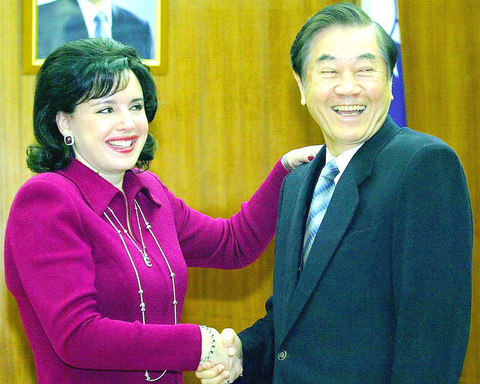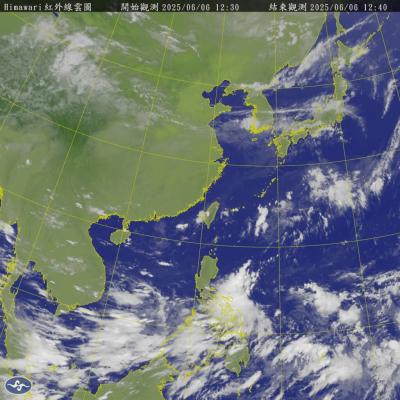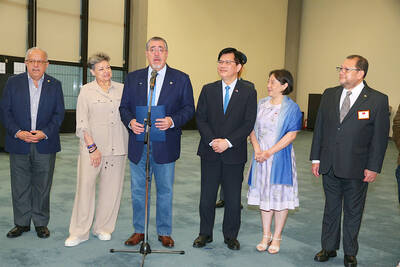Long-standing assumptions about US intervention in the Taiwan Strait may be being reconsidered, former chairwoman of the American Institute in Taiwan (AIT) Therese Shaheen said on Thursday, even as many analysts believe that recent comments from senior US officials indicate a change in the Bush administration's stance on Taiwan.
In an exclusive interview with the Taipei Times, Shaheen said that the Legislative Yuan's delay in passing the NT$610.8 billion special arms budget was "a major problem" for many senior defense officials.

PHOTO: WANG YI-SUNG, TAIPEI TIMES
She denied, however, that the purpose of her trip to Taiwan was to lobby for the special arms deal, or that she or any of her family members had any business interests tied to the defense industry.
"I want to be very clear about this: My company has nothing to do with the special arms deal or any arms sales at all," Shaheen, who is now the president and chief operating officer of US-Asia Commercial Development Corp, said. US-Asia is primarily an information and communications technology firm, she added.
A defense industry source, speaking on condition of anonymity, confirmed Shaheen's assertion.
US-Asia has never been in the defense industry or sold any defense-related technology to Taiwan, the source said. He said that IT infrastructure was by its very nature dual-use (usable by both civilian industries and the military) technology, but US-Asia's business had not been with the military.
Shaheen, who still maintains high-level contacts with the government in Taiwan, also denied allegations that she was "in the pocket of the Democratic Progressive Party (DPP)."
"I believe Taiwan has everything to gain from a strong multi-party system," she said. Her support for President Chen Shui-bian (陳水扁) and his administration when she was the head of AIT was for two reasons, she said.
The first was her belief that Taiwan, as a thriving democracy, was being mistreated in the international community.
"Even Iraq under Saddam got better treatment than Taiwan," she said, referring to the fact that Iraq, even after the 1991 Gulf War, was a member of the UN.
"Is that right? Is this how the world community is supposed to treat a democracy?"
The second reason she had been outspoken in support of the Chen administration was because of how impressed she was by its integrity.
"I have been traveling to Taiwan since 1988," she said. "You have no idea how corrupt things used to be. The Chen administration has been different. And in my dealings with him he has shown a great deal of integrity. When he said he would do something, he would do it."
However, Taiwan's democratization is something that has not fully been grasped by many people in Washington. Shaheen used the arms deal as an example to illustrate her point.
Misinterpretation
"Before, when the US would approve weapons systems for Taiwan, the KMT administration would just buy it. The US defense industry liked that. Things are different now. Taiwan is a democracy, and the ruling party can't just do whatever it wants. There has to be a debate, and this hasn't really sunk in with some US officials," Shaheen said.
The reason that the special arms budget had become a stumbling block in US-Taiwan relations was because some had "completely misinterpreted" what had been happening in Taiwan since the Chen administration came to power, she said.
The trouble really began in 2002, when some people in the US began interpreting the lack of progress over the arms budget as a sign that Taiwan was trying to "get a free ride" on defense at the US' expense, Shaheen said.
A number of people in Washington's Asian affairs community were saying that Chen was taking advantage of US President George W. Bush pledge in 2001 to "do whatever it takes" to defend Taiwan, Shaheen said. Some officials, believing President Bush's goodwill had been betrayed, quickly turned sour on Chen, Shaheen said.
Furthermore, she said the officials believed that Chen was unnecessarily provoking China, while at the same time refusing to do anything to boost Taiwan's military at a time the cross-strait military balance was beginning to shift in China's favor.
"Since the DPP came to power for the first time time in 2000, it took some time for the party to discern which aspects of the arms procurement were necessary, and which were patronage. By the time that it was clear what was needed and what wasn't, elections were approaching and the issue became a political football," Shaheen said.
`Provocations'
In response to a question about whether Taiwan was provoking China through pro-independence rhetoric, Shaheen said the statements that Chen had made had long been a part of DPP rhetoric.
This served the party fine when it was in opposition, but could be dangerous now that the DPP was the ruling party, particularly when the cross-strait military balance was beginning to shift in the PRC's favor, she said.
"[Former president] Lee Teng-hui (
"It is no secret that Beijing isn't impressed by weakness. You impress them by being serious, and that means having serious capabilities," she said.
"Now, Beijing has become emboldened because they don't feel they have to even cater to the pan-blues -- just look at what happened to [Taipei Mayor] Ma Ying-jeou (
The issue now, Shaheen said, was that Taiwan had to get serious about its defense capabilities -- this is not primarily about buying weapons. In fact, the guidelines for defense priorities that the US had suggested to Taiwan were meant to try to suggest to Taiwan with the necessary systems to prevent war and enable allies to respond to any crisis in the Taiwan Strait.
Early Warning
"Many of the items on the list are systems, such as early warning radar and command and control items. We aren't talking about weapons in the traditional sense -- these systems do not kill people. Many of them are designed simply to facilitate communications and provide early warning for Taiwan," she said.
Many people in the US aren't so concerned about the content of the arms budget, but the symbolism is important, she said.
The trouble over the special budget in the pan-blue dominated Legislative Yuan has led many analysts to believe that Taiwan was not committed to its own defense, Shaheen said.
"My concern is that some people in the US think that we have to have other options, aside from coming to Taiwan's aid. They think it is impractical, given Taiwan's reduced capabilities," she said.
Shaheen refused to comment on recent remarks by US Secretary of State Colin Powell and Deputy Secretary of State Richard Armitage, but many analysts believe that the shift in opinion by some US policymakers about Taiwan's defense may have been the reason Armitage said the decision to intervene in a cross-strait conflict would rest with Congress.
This would appear to reflect Shaheen's concern about the US' willingness to aid Taiwan.
"That is why I keep encouraging Taiwan to acquire the systems the US has recommended as priority items," she said.
Seriousness needs to be shown
The best way for Taiwan to break the circular logic prevalent in Washington would be to do something substantial that demonstrates Taiwan's seriousness about defending itself and responsiveness to the US' requirements, should it be required to intervene in the Taiwan Strait, Shaheen said.
"I don't think the purchase of these systems will solve every problem in the US-Taiwan relationship. But if the Legislative Yuan would approve the procurement of some priority systems, it would help," she said.
Otherwise, "there is a danger that long-standing assumptions about what the US would do in the event Taiwan required US assistance would no longer apply," Shaheen said.

Greenpeace yesterday said that it is to appeal a decision last month by the Taipei High Administrative Court to dismiss its 2021 lawsuit against the Ministry of Economic Affairs over “loose” regulations governing major corporate electricity consumers. The climate-related lawsuit — the first of its kind in Taiwan — sought to require the government to enforce higher green energy thresholds on major corporations to reduce emissions in light of climate change and an uptick in extreme weather. The suit, filed by Greenpeace East Asia, the Environmental Jurists Association and four individual plaintiffs, was dismissed on May 8 following four years of litigation. The

STAY AWAY: An official said people should avoid disturbing snakes, as most do not actively attack humans, but would react defensively if threatened Taitung County authorities yesterday urged the public to stay vigilant and avoid disturbing snakes in the wild, following five reported snakebite cases in the county so far this year. Taitung County Fire Department secretary Lin Chien-cheng (林建誠) said two of the cases were in Donghe Township (東河) and involved the Taiwan habus, one person was bit by a Chinese pit viper near the South Link Railway and the remaining two were caused by unidentified snakes. He advised residents near fields to be cautious of snakes hiding in shady indoor areas, especially when entering or leaving their homes at night. In case of a

A tropical disturbance off the southeastern coast of the Philippines might become the first typhoon of the western Pacific typhoon season, the Central Weather Administration (CWA) said. The system lacks a visible center and how it would develop is only likely to become clear on Sunday or Monday, the CWA said, adding that it was not yet possible to forecast the potential typhoon's effect on Taiwan. The American Meteorological Society defines a tropical disturbance as a system made up of showers and thunderstorms that lasts for at least 24 hours and does not have closed wind circulation.

DIPLOMACY: It is Guatemalan President Bernardo Arevalo’s first visit to Taiwan since he took office last year, while Eswatini’s foreign minister is also paying a visit A delegation led by Guatemalan President Bernardo Arevalo arrived in Taiwan yesterday afternoon and is to visit President William Lai (賴清德) today. The delegation arrived at Taiwan Taoyuan International Airport at 4:55pm, and was greeted by Minister of Foreign Affairs Lin Chia-lung (林佳龍). It is Arevalo’s first trip to Taiwan since he took office last year, and following the visit, he is to travel to Japan to celebrate the 90th anniversary of diplomatic relations between the two countries. Arevalo said at the airport that he is very glad to make the visit to Taiwan, adding that he brings an important message of responsibility